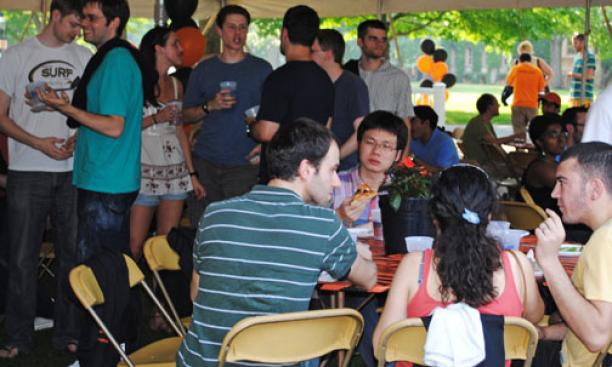

A pizza and ice cream celebration for grad students who have passed their generals. Moving the hooding ceremony for graduate-degree recipients to Princeton Stadium to accommodate more guests. More e-mail communications with grad alumni.
These are small steps, perhaps, but they’re signs that Princeton is paying more attention to the grad-student experience and to the connection with graduate alumni, according to University officials.
A year ago the Commission on Graduate Alumni Relations issued a 24-page report that urged the University to work toward equitable treatment of graduate students and alumni with their undergraduate counterparts.
At a meeting during Reunions of the board of the Association of Princeton Graduate Alumni (APGA), which created the commission, alumni and University officials gave an upbeat progress report on the commission’s proposals. “It’s very heartening to see all the attention,” said APGA president Rose Li *92.
New graduate-student housing planned for the Hibben-Magie site that “recognizes the importance of community space” and the reopening of a campus pub — recommended by another study this spring — would have significant benefits for grad students, said University vice president and secretary Robert Durkee ’69.
William Russel, dean of the graduate school, said initiatives now under way range from a Facebook page that would serve as a “virtual home” for all grad students to planning for renovations of the “old Frick” chemistry lab that could provide grad-student space.
Margaret Miller ’80, assistant vice president for alumni affairs, said graduate alumni are receiving electronic newsletters from the APGA and e-mail alerts with each issue of PAW that highlight content of special interest to grad alums.
The commission report found overlapping missions in reaching grad alumni among the graduate school, the Alumni Association, and the APGA. Li said ways to integrate APGA and Alumni Association efforts will be explored over the next year.
At the same time, she said, the APGA wants to enhance its strong working relationship with the graduate school to further improve the graduate-student experience.
The graduate school is encouraging individual departments to reach out to their alumni, an idea endorsed by the commission. Russel said that the geosciences and art and archaeology departments would like to host two- to three-day reunions of their graduate alumni, separate from Reunions weekend, if University funding is approved.
The commission said the University’s 40-member board of trustees should include at least 10 graduate alumni, reflecting the proportion of grad alums in the alumni body. There are now three graduate alumni on the board, with two seats reserved for them.
Durkee said that while the board felt that it would be desirable to add graduate alumni, the trustees decided not to set aside additional seats for them. The board also chose not to earmark a seat specifically for a young grad alum as the commission recommended, similar to the seat that exists for a young undergraduate alumnus.
Instead, Durkee said, the board charged its board development committee to consider and nominate more graduate alumni.
